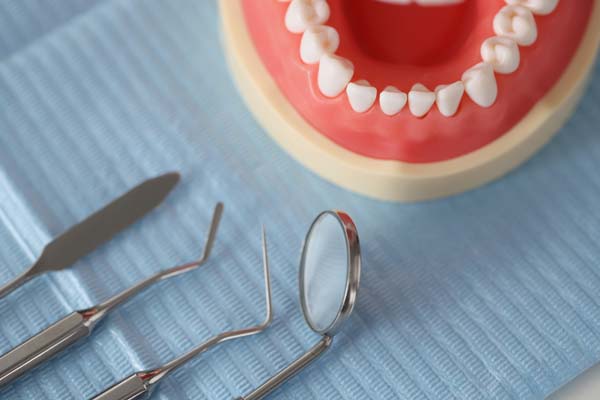Adjusting to New Dentures: The Best Methods for Your New Smile

If you have recently replaced a mouthful of teeth, you are probably adjusting to new dentures. Although dentures greatly improve your smile, this does not mean you immediately become used to wearing them. The good news is there are methods you can use to help adjust, and in about a month, your dentures should start feeling normal.
Methods for adjusting to new dentures
Do not be alarmed if it feels like you have a foreign object in your mouth after you first get dentures. This is normal, and it takes some time to get used to them. This transition process often goes a bit quicker if you follow certain tips.
Manage discomfort
You need to get used to wearing dentures, but your gums and soft tissues in the mouth also must adapt. Immediately after placing the dentures, your dentist will make any necessary adjustments for fit. However, you may still notice some discomfort over the next couple of weeks.
The dentist may recommend that you take the dentures out occasionally to give your gums a break. If sores develop on the gums, rinse with salt water to ease the pain and keep them clean. Over-the-counter pain relievers may also help if you have swelling or discomfort.
As your jaw settles and the gums heal, your dentures will probably require additional adjustments. Your dentist will take care of this as necessary for your comfort and a proper fit.
Train your cheeks
Your cheek muscles assist in talking and eating, and those two tasks become a little easier if you exercise the muscles. You can get a head start by beginning the exercises before you get your new dentures. The process is easy: All you need to do is smile really wide and hold it for about 20 seconds. You should do this four or five times daily.
Practice speaking
When it comes to adjusting to new dentures, speaking can be a challenge. Talking may feel awkward, and certain sounds are sometimes hard to pronounce at first. Make sure you use the right dental adhesive to help to keep the dentures in place.
Practice speaking out loud at home before talking in front of anyone else. It may help to bite down gently and then swallow before speaking. Talking in front of a mirror and singing are also helpful.
Alter your diet
Eating is also difficult at first. In the beginning, select soft foods for meals, such as yogurt, mashed potatoes, soft pasta, mashed bananas, and scrambled eggs, since they are gentle on your gums and help you get used to eating with dentures. You should chew slowly and take small bites. To avoid damaging the dentures, refrain from crunchy, hard, and sticky foods.
Conclusion
Although adjusting to new dentures is not fun, it is worth it to have a new and improved smile. Ease into wearing them and practice the more challenging tasks so you can utilize them with confidence.
Request an appointment here: https://www.riverfrontdentalassociates.com or call Riverfront Dental Associates at (423) 303-7869 for an appointment in our Chattanooga office.
Check out what others are saying about our dental services on Yelp: Adjusting to New Dentures in Chattanooga, TN.
Related Posts
Patients who are adjusting to new dentures may be interested in what types of materials are used to create them. There are several options to choose from when deciding on what kind of dentures to get. A few factors a patient should consider are whether he or she needs partial or full dentures, how long…
A broken dental crown is often a sudden issue. Dental crowns are permanent dental restorations. A crown may dislodge because of an injury, an accident, wear, or even old age. The dentist will determine if your crown needs repairs or a replacement. If you want to know what the dentist does to repair or replace…
Scaling and root planning treats periodontal disease. However, not every case of periodontal disease requires scaling and root planing. This review helps you determine if treatment is necessary for you and discusses how the treatment process works and how to prevent gum disease. Anyone who has signs of a progressive stage of periodontal disease should visit…
If you've knocked out a tooth, it's an emergency dentistry situation, and you should call your dentist immediately. If they can't see you right away, an emergency dentist can help you in the meantime by putting the tooth back in place and providing emergency dental care until you can get to the dentist's office. Read…
